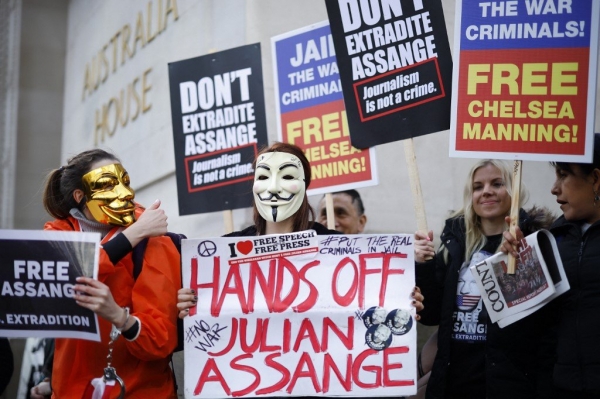![Stella Morris the wife of Julian Assange talks to the media outside Westminster Magistrates' Court in London, in April 2022. [Morning Star]](/news/photo/202205/126608_110366_4728.jpg)
The family of jailed journalist Julian Assange is hopeful that the newly elected Australian government will pave the way for his release and return to his home country.
Prime Minister Anthony Albanese has previously expressed his support for the WikiLeaks founder, who has spent the last three years in London’s Belmarsh prison.
In February last year, he said that “enough is enough,” adding that “he can’t see what’s served by keeping [Assange] incarcerated.” Mr Albanese is also a signatory to the Bring Julian Assange Home petition.
Labour MP Mark Dreyfus, who is widely expected to be named attorney general, has also spoken of the need to “bring the matter to a close.”
Mr Assange’s brother, film producer Gabriel Shipton, said that his sibling is being persecuted for publishing the ugly truth about war.
“Julian is accused of what investigative journalists do all the time, which is sourcing and publishing materials from a source; Chelsea Manning.
“Those releases exposed war crimes in Iraq, undocumented civilian deaths on Iraq, government malfeasance, all sorts of things.”
Mr Assange could be extradited from Britain to the United States, where he faces 175 years behind bars under the draconian Espionage Act.
The decision on whether to grant the US request rests with Home Secretary Priti Patel.
![Julian Assange. [AP]](/news/photo/202205/126608_110367_5416.jpg)
Commissioner calls on UK government not to extradite Julian Assange
In a letter, published 18th of May, the Council of Europe Commissioner for Human Rights, Dunja Mijatović, called on UK Home Secretary Priti Patel not to extradite Julian Assange.
Writing in view of the impending decision on Mr Assange’s extradition, the Commissioner noted that the wider human rights implications of doing so had not yet been adequately considered in the extradition proceedings. She particularly highlighted that the indictment by the United States against Mr Assange raised important questions about the protection of those that publish classified information in the public interest, including information that exposes human rights violations. She concluded that allowing Mr Assange’s extradition on this basis would have a chilling effect on media freedom, and could ultimately hamper the press in performing its task as purveyor of information and public watchdog in democratic societies. Following is the letter.

I am writing to you regarding the case of Mr Julian Assange, since a decision will soon be made about his extradition to the United States. While I have expressed myself publicly on this matter before, at this important juncture in the extradition procedure I wish to convey my views to you directly.
I have been following the developments in Mr Assange’s case with great attention. In the judicial proceedings so far, the focus has mainly been on Mr Assange’s personal circumstances upon his possible extradition to the United States. While a very important matter, this also means, in my opinion, that the wider human rights implications of Mr Assange’s possible extradition, which reach far beyond his individual case, have not been adequately considered so far.
In particular, it is my view that the indictment by the United States against Mr Assange raises important questions about the protection of those that publish classified information in the public interest, including information that exposes human rights violations. The broad and vague nature of the allegations against Mr Assange, and of the offences listed in the indictment, are troubling as many of them concern activities at the core of investigative journalism in Europe and beyond.

Consequently, allowing Mr Assange’s extradition on this basis would have a chilling effect on media freedom, and could ultimately hamper the press in performing its task as purveyor of information and public watchdog in democratic societies.
As I have previously stated, it is my position that, taking into account both these wider implications and the concerns raised by independent experts about Mr Assange’s treatment upon extradition, the government of the United Kingdom should not allow his extradition to the United States. I therefore call upon you to decide against the extradition of Mr Assange.
I look forward to continuing our ongoing dialogue on this issue and other matters of mutual interest.
Wikileaks / Morning Star

wiki@wikileaks-kr.org


